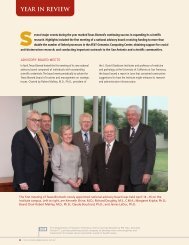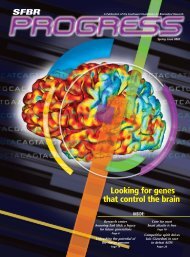Texas Biomed Science Report 2011-2012 - Texas Biomedical ...
Texas Biomed Science Report 2011-2012 - Texas Biomedical ...
Texas Biomed Science Report 2011-2012 - Texas Biomedical ...
You also want an ePaper? Increase the reach of your titles
YUMPU automatically turns print PDFs into web optimized ePapers that Google loves.
Melanie Carless, Ph.D.<br />
Assistant Scientist, Genetics<br />
Although researchers are beginning to make progress in understanding<br />
the biological mechanisms that drive complex disease development,<br />
many areas of study are only just starting to be explored. Epigenetic<br />
mechanisms, such as genomic methylation and microRNA regulation,<br />
are now being seen as significant players contributing to the development<br />
of complex diseases, although how these factors integrate with our<br />
genetic architecture is not well understood. Carless’s research focuses<br />
on identifying epigenetic variation that contributes to the development<br />
of various complex diseases and how these changes might influence<br />
and interact with genetic variation to propel disease progression.<br />
Carless is investigating how changes in microRNA expression<br />
regulate gene expression to influence variation in neuroanatomical and<br />
neurocognitive endophenotypes, and how this variation might play<br />
a role in psychiatric disorders. Recently, her laboratory has identified<br />
several microRNAs whose expressions are both heritable and appear to<br />
influence neuroanatomical traits associated with depression. In addition,<br />
Carless and her colleagues have uncovered evidence that genomic<br />
methylation within a number of genes is correlated with many metabolic<br />
syndrome-related phenotypes, such as measures of obesity, blood<br />
pressure and insulin and glucose levels; as well as with neuroanatomical<br />
and neurocognitive traits. Carless has also continued to assess the role<br />
of genetic variation in depression and neurological traits, identifying<br />
several variants within an important psychiatric-related gene that<br />
contribute to differences in neuroanatomical and neurocognitive traits.<br />
Carless believes that it is essential to gain a better understanding<br />
of both genetic and epigenetic factors driving the development and<br />
Staff<br />
Left to right: Jennifer Neary, Sarah<br />
Heltzel, Melanie Carless, Hemant<br />
Kulkarni, Kara Peterson, Jessica Valdez<br />
<strong>2011</strong>–<strong>2012</strong> Scientific <strong>Report</strong><br />
“The focus of our work is in identifying epigenetic events that contribute to the development<br />
of complex diseases. By merging findings from both genetic and epigenetic studies, we hope to<br />
better delineate the biological mechanisms that drive the development of psychiatric disorders,<br />
heart disease and cancer, thus identifying novel targets for drug development.”<br />
Publications<br />
• Dasgupta P, Rizwani W, Pillai S, Kinkade R, Rastogi S, Banerjee S, Kovacs M, Carless M,<br />
Kim E, Haura E, Coppola D, Chellappan S (2009) Nicotine induces cell proliferation, invasion<br />
and epithelial-mesenchymal transition in a variety of human cancer cell lines. Int J Cancer<br />
124:36-45.<br />
• Prior MJ, Foletta VC, Jowett J, Segal DH, Carless MA, Curran JE, Dyer TD, Stern MP, Moses<br />
EK, Collier GR, Blangero J, Walder KR (2010) Abelson Helper Integration Site-1 is a<br />
candidate gene for insulin resistance and type 2 diabetes. Metabolism 59:1057-64.<br />
• Glahn DC, Winkler AM, Kochunov P, Almasy L, Duggirala R, Carless MA, Curran JC, Olvera<br />
RL, Laird AR, Smith SM, Beckmann CF, Fox PT, Blangero J (2010) Genetic control over the<br />
resting brain. Proc Natl Acad Sci USA 107:1223-8.<br />
• Gawrieh S, Baye TM, Carless M, Wallace J, Komorowski R, Kleiner DE, Andris D, Makladi B,<br />
Cole R, Charlton M, Curran J, Dyer TD, Charlesworth J, Wilke R, Blangero J, Kissebah AH,<br />
Olivier M (2010) Hepatic gene networks in morbidly obese patients with nonalcoholic fatty<br />
liver disease. Obes Surg 20:1698-709.<br />
• Carless MA, Glahn DC, Johnson MP, Curran JE, Bozaoglu K, Dyer T, Winkler A, Cole S,<br />
Almasy L, MacCluer J, Duggirala R, Moses E, Goring HHH, Blangero J (<strong>2011</strong>) Impact of DISC1<br />
variation on neuroanatomical and neurocognitive phenotypes. Mol Psychiatry 16:1096-104.<br />
• Glahn DC, Curran JE, Winkler AM, Carless MA, Kent JW Jr, Charlesworth JC, Johnson MP,<br />
Göring HH, Cole SA, Dyer TD, Moses EK, Olvera RL, Kochunov P, Duggirala R, Fox PT,<br />
Almasy L, Blangero J (<strong>2011</strong>) High dimensional endophenotype ranking in the search for<br />
major depression risk genes. Biol Psychiatry: Epub ahead of print.<br />
progression of mental disorders, heart disease and cancer in order<br />
to identify appropriate biological targets for better therapeutic<br />
intervention. Recent advances in the field have resulted in the<br />
development of therapeutics that specifically target methylation and<br />
microRNA expression. It is hoped that the reversal of deleterious<br />
changes will lead to a return of normal genetic regulation. Her work<br />
aims to advance the current knowledge of epigenetic involvement<br />
in complex diseases and determine interactions that influence<br />
genetic regulation to identify novel targets for drug development.<br />
E For more information, please visit www.txbiomed.org/departments/<br />
genetics/genetics-staff-bio?u=128<br />
11


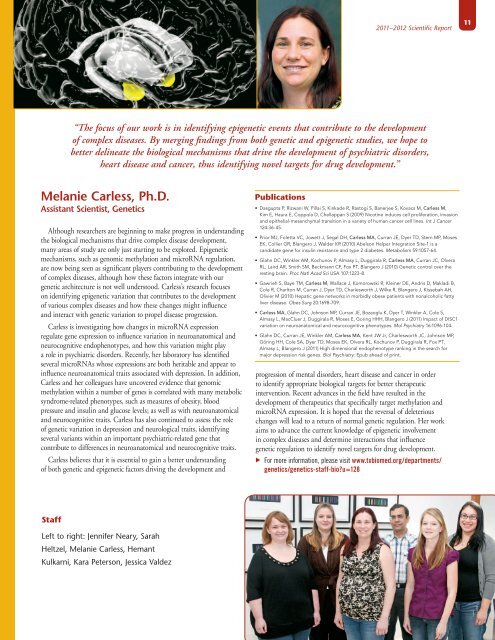

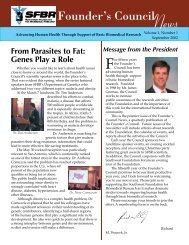

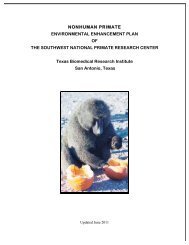
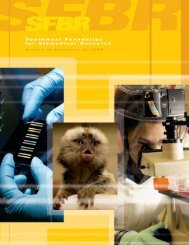
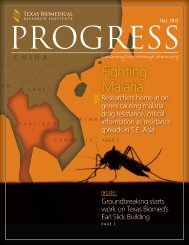

![Vol. 8 No. 2, 2011 [PDF] - Texas Biomedical Research Institute](https://img.yumpu.com/35688099/1/190x245/vol-8-no-2-2011-pdf-texas-biomedical-research-institute.jpg?quality=85)

